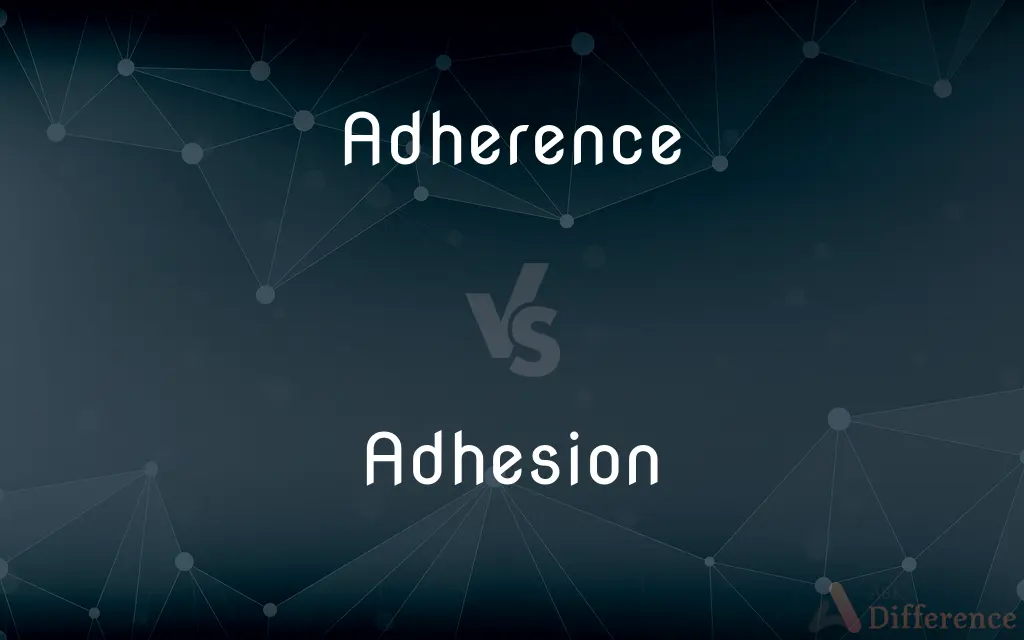Adherence vs. Adhesion — What's the Difference?
By Urooj Arif & Maham Liaqat — Updated on March 18, 2024
Adherence is the commitment or attachment to a belief or plan, while adhesion refers to the physical sticking of two surfaces.

Difference Between Adherence and Adhesion
Table of Contents
ADVERTISEMENT
Key Differences
Adherence is primarily about the commitment, loyalty, or attachment to something, such as an idea, policy, or regimen. It involves a psychological or moral component, emphasizing the act of following or holding onto a chosen path. Whereas adhesion focuses on the physical process or phenomenon by which two surfaces become attached to each other. It is often used in scientific and technical contexts to describe how materials bond or stick together.
In the context of health and medicine, adherence describes how well a patient follows a prescribed treatment plan or medication regimen. This concept is crucial for the effectiveness of treatment outcomes and is measured by the extent to which a patient's behavior matches agreed recommendations from a healthcare provider. On the other hand, adhesion in medical terms can refer to abnormal bands of scar tissue that form between internal organs and tissues, often as a result of surgery, causing them to stick together.
Adherence involves an element of choice and active participation, indicating a person's willingness to stick to an agreement, guideline, or set of rules. It is often used in contexts that require sustained commitment or observance. Adhesion, however, is more about the inherent properties of materials or biological tissues that cause them to stick or hold together, without implying any form of decision or volition.
The effectiveness of adherence can be influenced by factors such as personal beliefs, understanding of the benefits, and the perceived importance of the commitment being made. These psychological factors play no role in adhesion, which is determined by physical and chemical properties, such as surface energy, viscosity, and molecular interaction.
While adherence is a concept that can be applied to various fields, including law, religion, and personal behavior, indicating a broader scope of application, adhesion is a term with specific uses in physics, chemistry, and materials science. It describes a critical property that affects the performance and reliability of products, from medical adhesives to building materials.
ADVERTISEMENT
Comparison Chart
Definition
Commitment or attachment to a belief or plan.
Physical sticking of two surfaces.
Context
Psychological, moral, medical.
Scientific, technical, medical (specifically).
Element of Choice
Involves an element of choice and participation.
No element of choice; based on physical properties.
Influencing Factors
Personal beliefs, understanding, perceived importance.
Physical and chemical properties like surface energy.
Fields of Application
Law, religion, health, personal behavior.
Physics, chemistry, materials science.
Compare with Definitions
Adherence
Influenced by beliefs and the importance of commitments.
Adherence to dietary restrictions often requires strong personal motivation.
Adhesion
Determined by molecular interactions and surface characteristics.
Surface treatments can enhance the adhesion between different materials.
Adherence
Involves personal decision to follow or comply.
Adherence to the company's code of conduct is expected from all employees.
Adhesion
The act of two surfaces sticking together.
The adhesion between the tape and the surface was strong.
Adherence
Assessed through actions in line with recommendations.
The coach praised her adherence to the training schedule.
Adhesion
Essential in various industries for product performance.
Adhesion is crucial in paint and coatings technology.
Adherence
Critical in medical outcomes.
Patient adherence to medication regimens is vital for recovery.
Adhesion
Evaluated based on physical interactions.
Scientists study the adhesion properties of new materials for medical implants.
Adherence
Faithful attachment to beliefs or plans.
His adherence to environmental conservation motivated others.
Adhesion
Occurs through natural or induced processes.
The adhesion of cells is a fundamental biological process.
Adherence
The process or condition of adhering.
Adhesion
Adhesion is the tendency of dissimilar particles or surfaces to cling to one another (cohesion refers to the tendency of similar or identical particles/surfaces to cling to one another). The forces that cause adhesion and cohesion can be divided into several types.
Adherence
Faithful attachment; devotion
"rigid adherence to ... the teachings of a single man" (Janet Reitman).
Adhesion
The process or condition of sticking or staying attached
The adhesion of the glue to wood.
Adherence
A close physical union of two objects.
Adhesion
(Physics) The physical attraction or joining of two substances, especially the macroscopically observable attraction of dissimilar substances.
Adherence
Faithful support for some cause.
Adhesion
A condition in which bodily tissues that are normally separate grow together.
Adherence
(medicine) An extent to which a patient continues an agreed treatment plan.
Adhesion
A fibrous band of scar tissue that binds together normally separate anatomical structures.
Adherence
The fulfilment of the legal obligation of residing with wife or husband.
Adhesion
Attachment or devotion, as to a religion or belief.
Adherence
The quality or state of adhering.
Adhesion
The ability of a substance to stick to an unlike substance.
Adherence
The state of being fixed in attachment; fidelity; steady attachment; adhesion; as, adherence to a party or to opinions.
Adhesion
Persistent attachment or loyalty.
Adherence
Faithful support for a religion or cause or political party
Adhesion
An agreement to adhere.
Adherence
The property of sticking together (as of glue and wood) or the joining of surfaces of different composition
Adhesion
(medicine) An abnormal union of surface by the formation of new tissue resulting from an inflammatory process.
Adhesion
(biochemistry) The binding of a cell to a surface or substrate.
Adhesion
The frictional grip on a surface, of wheels, shoes etc.
Adhesion
The action of sticking; the state of being attached; intimate union; as, the adhesion of glue, or of parts united by growth, cement, or the like.
Adhesion
Adherence; steady or firm attachment; fidelity; as, adhesion to error, to a policy.
His adhesion to the Tories was bounded by his approbation of their foreign policy.
Adhesion
Agreement to adhere; concurrence; assent.
To that treaty Spain and England gave in their adhesion.
Adhesion
The molecular attraction exerted between bodies in contact. See Cohesion.
Adhesion
Union of surface, normally separate, by the formation of new tissue resulting from an inflammatory process.
Adhesion
The union of parts which are separate in other plants, or in younger states of the same plant.
Adhesion
Abnormal union of bodily tissues; most common in the abdomen
Adhesion
A fibrous band of scar tissue that binds together normally separate anatomical structures
Adhesion
The property of sticking together (as of glue and wood) or the joining of surfaces of different composition
Adhesion
Faithful support for a religion or cause or political party
Common Curiosities
How is adherence measured in healthcare?
It is measured by how well a patient's behavior matches the healthcare provider's prescribed treatment or medication regimen.
Is adhesion always a desirable property?
While often desirable in materials science and engineering, adhesion can be problematic in medical contexts, such as unwanted tissue adhesion after surgery.
Are there tests for measuring adhesion?
Yes, there are various tests and standards for measuring the adhesion of coatings, tapes, and other materials to surfaces.
What is the difference between adherence and adhesion?
Adherence is about commitment to a plan or belief, involving psychological choice, while adhesion refers to the physical sticking together of surfaces, determined by material properties.
Can adherence apply to non-physical concepts?
Yes, adherence can apply to ideas, beliefs, laws, and personal or medical regimens, involving a psychological component.
How does adhesion affect everyday products?
Adhesion affects the performance and reliability of many products, including adhesives, coatings, and medical implants.
Does adherence require awareness?
Yes, adherence involves a conscious decision and awareness of the commitment or guidelines being followed.
Can cultural factors influence adherence?
Cultural beliefs and practices can significantly influence adherence to medical treatments and lifestyle recommendations.
What is a common application of adhesion in daily life?
A common application includes the use of tapes and glues, where adhesion is essential for the bonding of materials.
What factors influence adhesion?
Adhesion is influenced by physical and chemical properties like surface energy, viscosity, and molecular interactions.
Can adherence be negative?
Adherence can be seen as negative if it leads to rigidly following harmful or outdated practices.
Can adherence change over time?
Yes, adherence can change based on factors like personal motivation, understanding of benefits, and external influences.
What role does adhesion play in surgery?
In surgery, adhesion can refer to the unintended sticking together of tissues, which can cause complications.
How is adherence encouraged in a healthcare setting?
Through education, reminders, and support systems, healthcare providers can encourage patient adherence to treatment plans.
How can adhesion be improved between materials?
Surface treatments, primers, and the use of specific adhesives can improve adhesion between different materials.
Share Your Discovery

Previous Comparison
Run vs. Work
Next Comparison
Instructor vs. TeacherAuthor Spotlight
Written by
Urooj ArifUrooj is a skilled content writer at Ask Difference, known for her exceptional ability to simplify complex topics into engaging and informative content. With a passion for research and a flair for clear, concise writing, she consistently delivers articles that resonate with our diverse audience.
Co-written by
Maham Liaqat













































